牛津译林版英语八年级下册Unit7 International Charities Grammar课件(共81张PPT)
文档属性
| 名称 | 牛津译林版英语八年级下册Unit7 International Charities Grammar课件(共81张PPT) |

|
|
| 格式 | zip | ||
| 文件大小 | 5.6MB | ||
| 资源类型 | 教案 | ||
| 版本资源 | 牛津译林版 | ||
| 科目 | 英语 | ||
| 更新时间 | 2020-06-30 00:00:00 | ||
图片预览

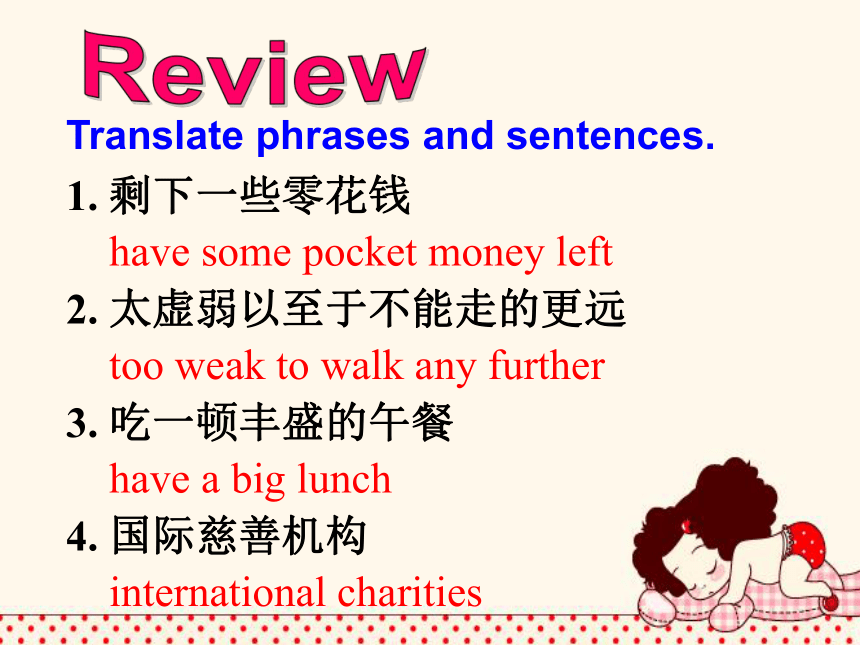
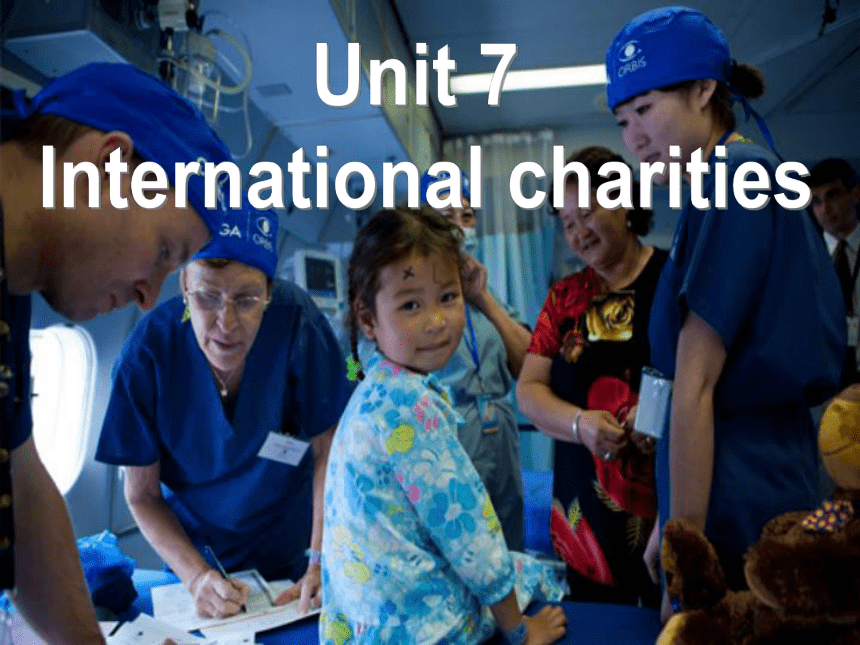
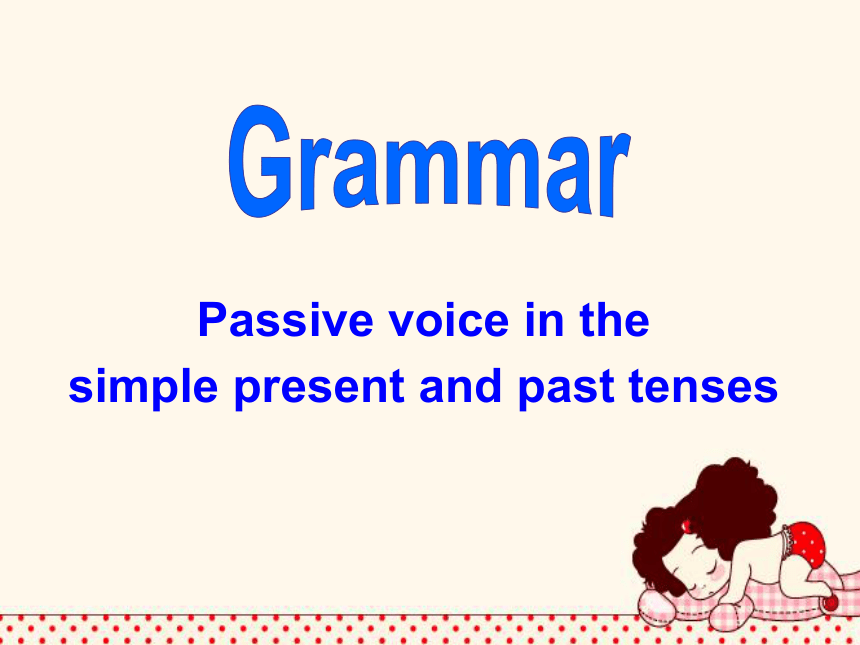
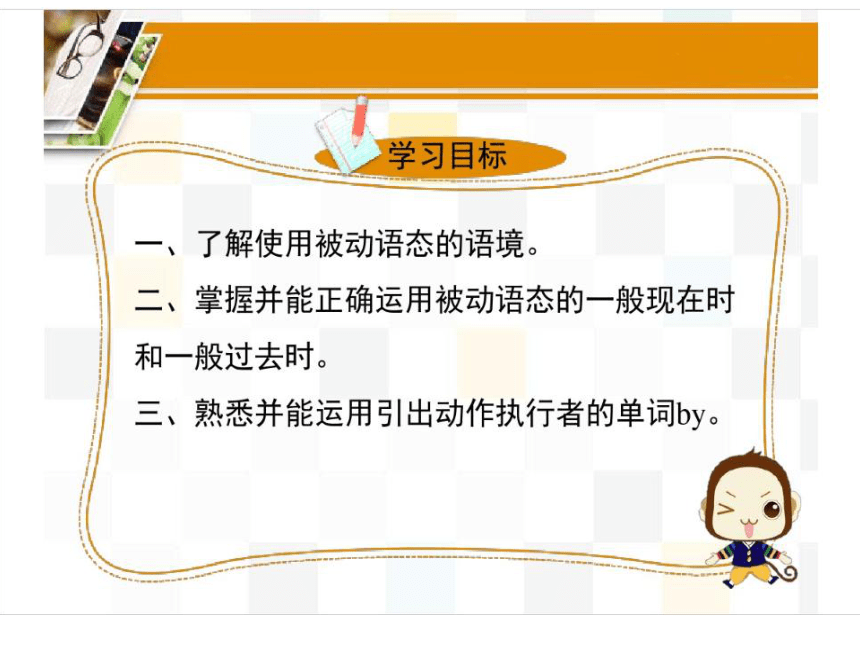
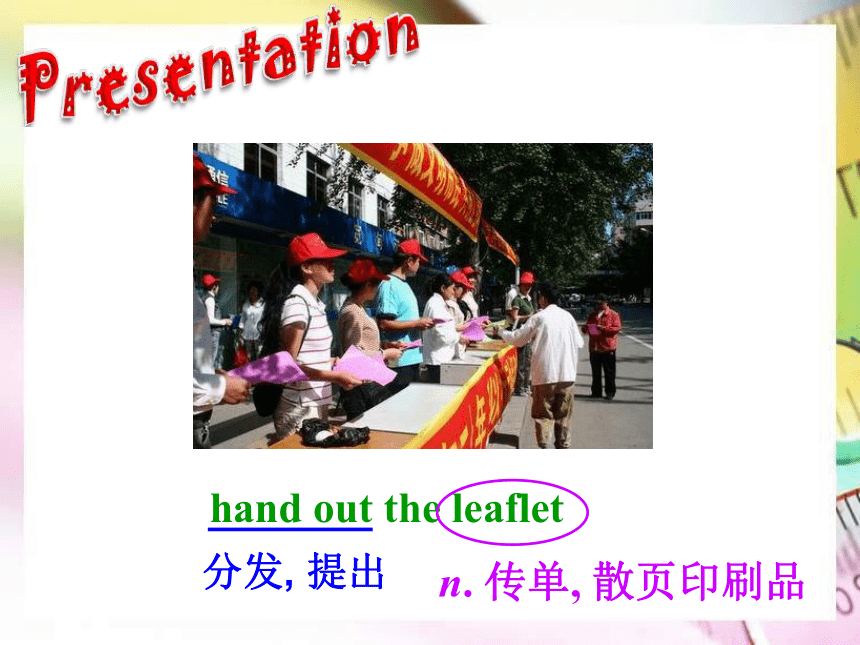
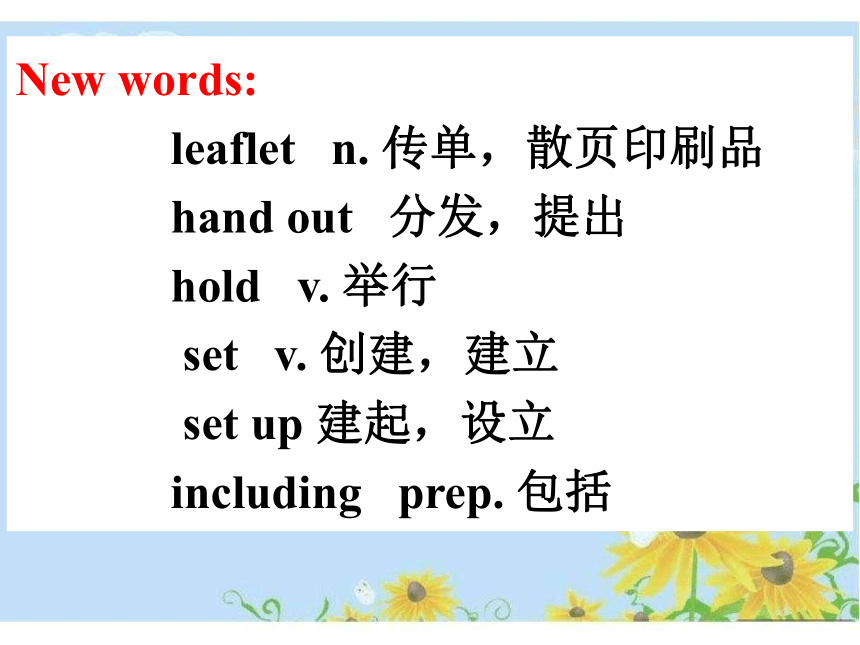
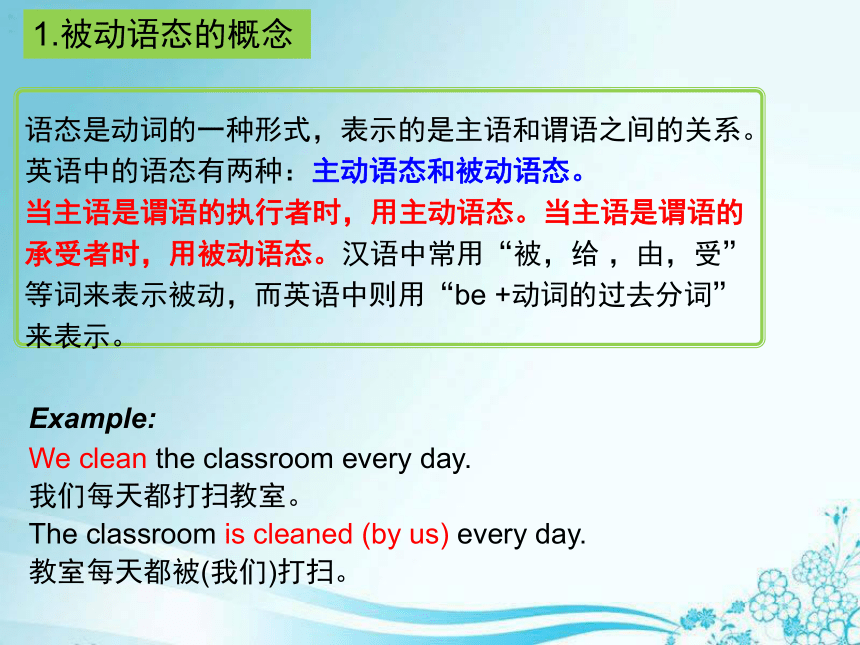
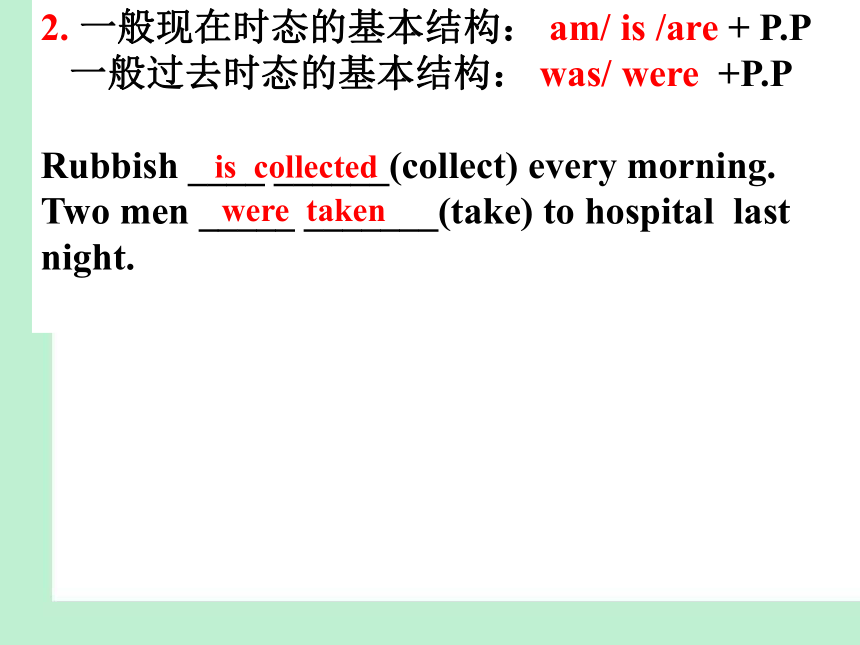
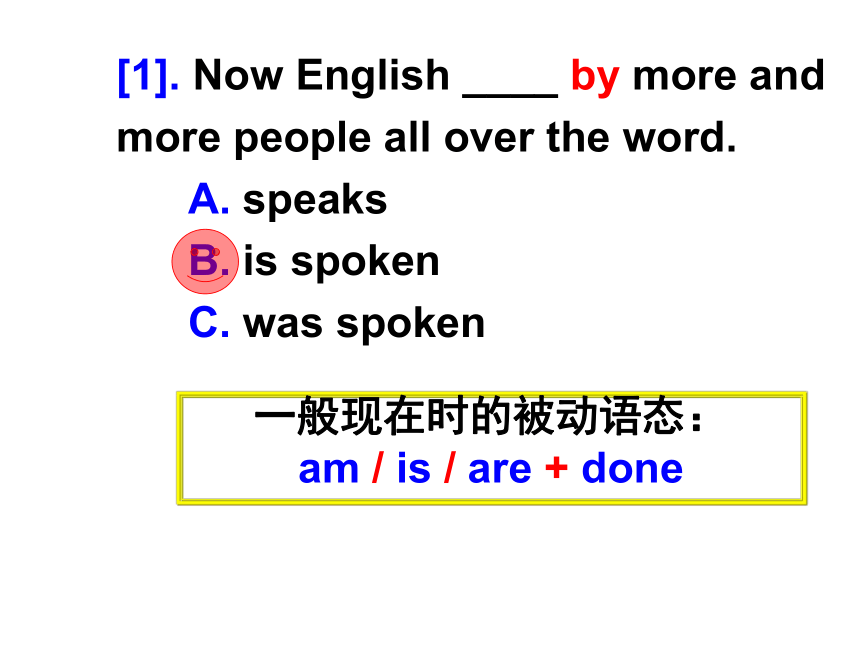
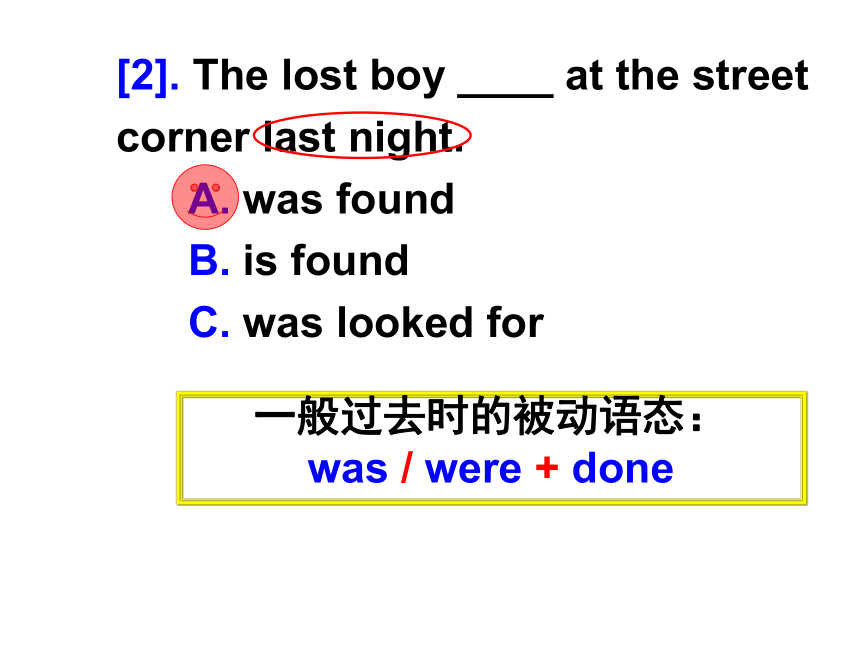
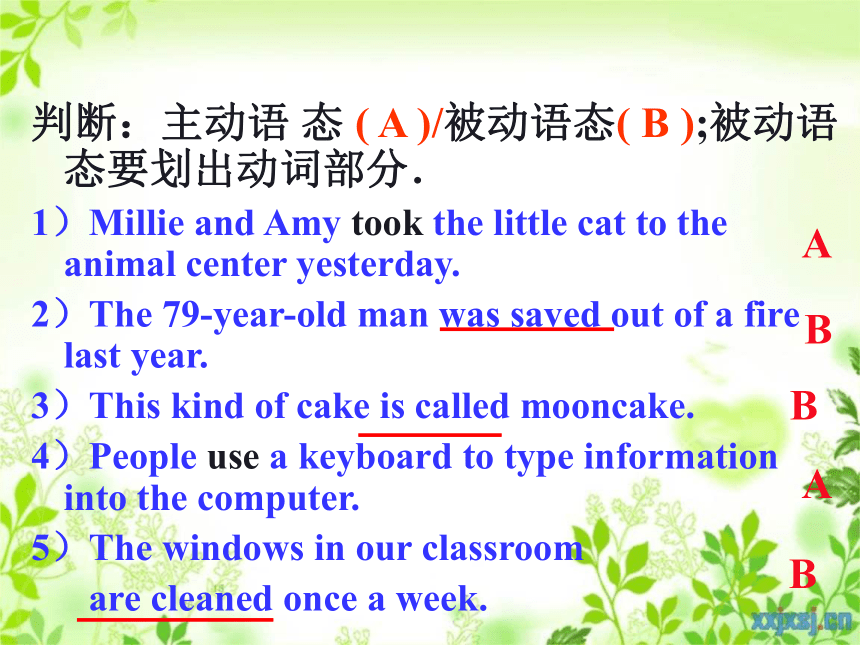
文档简介
(共81张PPT)
Translate
phrases
and
sentences.
1.
剩下一些零花钱
2.
太虚弱以至于不能走的更远
3.
吃一顿丰盛的午餐
4.
国际慈善机构
have
some
pocket
money
left
too
weak
to
walk
any
further
have
a
big
lunch
international
charities
Passive
voice
in
the
simple
present
and
past
tenses
n.
传单,
散页印刷品
hand
out
the
leaflet
分发,
提出
New
words:
leaflet
n.
传单,散页印刷品
hand
out
分发,提出
hold
v.
举行
set
v.
创建,建立
set
up
建起,设立
including
prep.
包括
语态是动词的一种形式,表示的是主语和谓语之间的关系。英语中的语态有两种:主动语态和被动语态。
当主语是谓语的执行者时,用主动语态。当主语是谓语的承受者时,用被动语态。汉语中常用“被,给
,由,受”等词来表示被动,而英语中则用“be
+动词的过去分词”来表示。
Example:
We
clean
the
classroom
every
day.
我们每天都打扫教室。
The
classroom
is
cleaned
(by
us)
every
day.
教室每天都被(我们)打扫。
1.被动语态的概念
2.
一般现在时态的基本结构:
am/
is
/are
+
P.P
一般过去时态的基本结构:
was/
were
+P.P
Rubbish
____
______(collect)
every
morning.
Two
men
_____
_______(take)
to
hospital
last
night.
is
collected
were
taken
[1].
Now
English
____
by
more
and
more
people
all
over
the
word.
A.
speaks
B.
is
spoken
C.
was
spoken
一般现在时的被动语态:
am
/
is
/
are
+
done
[2].
The
lost
boy
____
at
the
street
corner
last
night.
A.
was
found
B.
is
found
C.
was
looked
for
一般过去时的被动语态:
was
/
were
+
done
判断:主动语
态
(
A
)/被动语态(
B
);被动语态要划出动词部分.
1)Millie
and
Amy
took
the
little
cat
to
the
animal
center
yesterday.
2)The
79-year-old
man
was
saved
out
of
a
fire
last
year.
3)This
kind
of
cake
is
called
mooncake.
4)People
use
a
keyboard
to
type
information
into
the
computer.
5)The
windows
in
our
classroom
are
cleaned
once
a
week.
A
A
B
B
B
1.
The
cake
was
eaten
by
Daniel.
2.
Nancy
bought
a
book
yesterday.
3.
The
little
dog
is
looked
after
very
well
by
Simon.
4.
He
is
reading
English.
5.
The
computer
is
bought
by
my
uncle.
6.
I
am
woken
up
by
my
father
every
morning.
Underline
the
passive
voice
in
the
following
sentences.
2.一般现在时的被动语态的结构
肯定句:主语+am/is/are
+及物动词的过去分词+其他.
Example:English
is
taught
by
him.
否定句:主语+am/is/are
+not+过去分词+其他.
Example:English
isn’t
taught
by
him.
一般疑问句:Am/Is/Are
+
主语
+
过去分词+其他?
Example:
Is
English
taught
by
him?
特殊疑问句:疑问词+am/is/are+
主语
+
过去分词+其他?
Example:
Who
is
taught
English
by
him?
3.一般过去时的被动语态的结构
肯定句:主语+was/were+及物动词的过去分词+其他.
Example:
The
bridge
was
built
in
1999.
否定句:主语+
was/were+not+过去分词+其他.
Example:
The
bridge
wasn’t
built
in
1999.
一般疑问句:Was/Were
+
主语
+
过去分词+其他?
Example:
Was
the
bridge
built
in
1999?
特殊疑问句:疑问词+was/were+
主语
+
过去分词+其他?
Example:
When
was
the
bridge
built?
主语
be动词
过去分词
一般现在时
I
am
supported.
You/We/They
are
He/She/It
is
一般过去时
I
was
supported.
You/We/They
were
He/She/It
was
现在完成时的被动语态结构
肯定句:主语+have/has
+been+及物动词的过去分词+其他.
Example:The
book
has
been
sold
already.
否定句:主语+have/has
not
+been+过去分词+其他.
Example:The
book
hasn't
been
sold
yet.
将来,情态的被动语态
will(can,may,must)+be+过去分词
The
homework
will
be
finished
in
two
hours.
None
of
the
books
was
taken
away.
没有一本书被拿走。
动作的执行者是泛指或者不言自明时。
被动语态的基本用法
The
toy
is
designed
for
children.
在不知道动作的执行者是谁时。
这款玩具是为孩子们设计的。
需要强调动作的承受者时。
My
bike
was
repaired.
我的自行车修好了。
The
problem
was
talked
about
just
now.
出于委婉或礼貌而避谈动作的执行者时。
这个问题刚才被讨论过。
Mr
Wu
is
liked
by
all
of
his
students.
所有的学生都喜欢吴老师。
在被动语态的句子中,
如果我们需要指出动作的执行者,
可以由by引出。
被动语态还可用于某些习惯用语中,如“据说”、“据悉”、“有人说”、“大家说”、“出生于”等
e.g.
He
was
born
in
Nanjing.
It
is
said
that
the
75-year-old
man
can
still
eat
three
bowls
of
rice
for
lunch.
We
________(sweep)
the
floor
every
day.
The
floor_________(sweep)
by
us
every
day.
sweep
is
swept
They
________(plant)
the
trees
yesterday.
The
trees_________(palnt)
by
them
yesterday.
planted
were
planted
He
________(build)
the
house
last
year.
The
house_________(build)
by
him
last
year.
built
was
built
David
________(wash)
the
car
every
day.
The
car_________(wash)
by
David
every
day.
washes
is
washed
David
________(repair)
the
car
an
hour
ago.
The
car_________(repair)
by
David
an
hour
ago.
repaired
was
repaired
Many
people________(speak)
English.
English_________(speak)
by
many
people.
speak
is
spoken
This
kind
of
telephone__________(make)
in
China.
is
made
I
________(water)
the
flowers
every
morning.
The
flowers________(water)
by
me
every
morning.
water
are
watered
They
________(sell)
the
bags
yesterday.
The
bags_________(sell)
by
them
yesterday.
sold
were
sold
1.
Today
English
_______
all
over
China.
A.
teach
B.
teaches
C.
is
taught
D.
are
taught
2.
The
meeting
_______
two
weeks
ago.
A.
hold
B.
was
held
C.
were
held
D.
is
held
3.
The
thief
________
by
the
police
last
night.
A.
caught
B.
is
caught
C.
was
caught
D.
were
caught
4.
The
photos
_______
when
I
was
young.
A.
were
taken
B.
was
taken
C.
are
taken
D.
is
taken
5.
Millie
is
my
best
friend.
I
___
often
____
to
her
party.
A.
is
invited
B.
am
invited
C.
are
invited
D.
was
invited
6.
Last
year
Beijing
____
by
a
big
sandstorm.
A.
is
hit
B.
were
hit
C.
will
be
hit
D.
was
hit
主动语态变被动语态
第一步:主宾互换。
第二步:谓语动词变为“be+过去分词”,并通过be的变化来表达出不同的时态。
第三步:
“be+过去分词”
+
by
+原主语。
(有时by+原主语可省)
第四步:时间、地点状语等保持一致。
主变被四步曲
被动语态变化步骤
宾变主,主变宾,前加by
动变被,看清be,
结构分别be+pp.
by
many
students.
Many
students
study
English.
English
is
studied
Tree
Planting
Day
on
March
12th
We
plant
trees.
(主动语态)
Trees
are
planted
by
us.
(被动语态)
They
built
a
new
bridge.
(主动语态)
(被动语态)
A
new
bridge
was
built
by
them.
填空(完成被动语态填空)
1.
They
often
clean
their
classroom
after
school
.
(改为被动语态)
Their
classroom
_____
often
______
by
them
after
school.
2.
Li
Lei
gave
Tom
a
new
pen
last
week
.
(同上)
A
new
pen
_____
_______
_____
Tom
last
week
.
is
cleaned
was
given
by
Practice
3.I
found
the
ticket
on
the
floor.
______
______
______
______
on
the
floor.
4.I
told
her
to
return
the
book
in
time.
She
______
_______
to
return
the
book
in
time.
The
ticket
was
found
was
told
5.
The
foreign
friends
gave
us
some
wonderful
stamps.
1)
_______
______
_______
some
wonderful
stamps.
2)
Some
wonderful
stamps
_______
________
_______
_______.
we
were
given
were
given
to
us
把主动语态变为被动语态:
1.People
grow
rice
in
many
parts
of
China.
2.
She
held
a
charity
show
yesterday.
Rice
is
grown
by
people
in
many
parts
of
China.
A
charity
show
was
held
by
her
yesterday.
3.People
usually
post
Christmas
cards
in
December.
4.
We
bought
some
computers
last
week.
Christmas
cards
are
usually
posted
by
people
in
December.
Some
computers
were
bought
by
us
last
week.
主语+谓语+双宾语的句式转换
主动语态
主语
He
谓语(主动式)
passed
间宾
me
直宾
a
book.
被动语态
原直宾
A
book
谓语(被动式)
was
passed
to
me
by
原主语(改为宾格)him.
原间宾(改为主格)
I
谓语(被动式)
was
passed
原直宾
a
book
by
原主语(改为宾格)
him.
1.带双宾语句子的被动语态.一般把间接宾语变为
被动语态的主语,则另一个不动。如把直接宾语变为被动语态的主语则需在间宾前加
for
或
to
如:1.He
gave
me
a
book.
-I
was
given
a
book
by
him.
-A
book
was
given
to
me
by
Tom.
2.
I
bought
him
a
book.
-He
was
bought
a
book
by
me.
-A
book
was
buoght
for
him
by
me.
give
sb.
sth—
buy
sb
sth-
sb
be
given
sth
sb
be
bought
sth-
sth
be
given
to
sb.
sth
be
bought
for
sb.
【考点】
give
sb.
sth.
pass
sb.
sth.
sell
sb.
sth.
lend
sb.
sth.
bring
sb.
sth.
make
sb.
sth.
buy
sb.
sth.
Sth
be
given
to
sb.
Sth.
be
passed
to
sb.
Sth.
be
sold
to
sb.
Sth.
be
lent
to
sb.
Sth.
be
brought
to
sb.
Sth.
be
made
for
sb.
Sth.
be
bought
for
sb.
主动
被动
They
take
good
care
of
my
child.
I
turned
off
the
radio.
含有短语的主动语态变被动语态,
注意短语要完整,不能掉了介词
-----My
child
is
taken
good
care
of
.
---The
radio
was
turned
off
(by
me).
【考点】
look
for
look
after
take
care
of
hand
in
laugh
at
speak
to
be
looked
for
be
looked
after
be
taken
care
of
be
handed
in
be
laughed
at
be
spoken
to
不要漏掉介词.
Children
should
___.
A.
take
good
care
of
B.
be
taken
good
care
C.
be
taken
good
care
of
固定短语的被动不要丢掉后面的介词或副词
2.
不及物动词没有被动语态:
happen
,
take
place
,appear
3.need
表示需要时,后面加doing
表示被动含义
need
doing
=need
to
be
+pp
All
the
computers
need
repairing
.
All
the
computers
need
to
be
repaired
.
Your
bike
___.
A.
needs
repair
B.
needs
repairing
C.
needs
to
repair
need可以用-ing形式表示被动
need
to
be
done
=
need
doing
【考点】
sb
be
asked
to
do
sb
be
told
to
do
sb
be
invited
to
do
sb
be
chosen
to
do
sb
be
encouraged
to
do
sb
be
allowed
to
do
ask
sb.
to
do
tell
sb.
to
do
invite
sb.
to
do
choose
sb.
to
do
encourage
sb.
to
do
allow
sb.
to
do
主动
被动
4.
主动语态为带to的动词不定式
Mum
told
me
to
stay
at
home.
I
was
told
to
stay
at
home.
1.
有些动词,
其主动语态形式含有被动意义。如:
系动词smell,
taste,
sound,
feel
等。
e.g.
The
dish
smells
good.
这道菜闻起来很香。
The
music
sounds
nice.
这段音乐听起来不错。
[1].
①
Good
medicine
___
better
to
the
mouth.
A.
tastes
B.
is
tasted
C.
taste
②
This
pen
___
well.
A.
is
sold
B.
sell
C.
sells
感官动词,
和sell,write等动词用主动语态表被动.
还有一些不及物动词,
常用主动语态,
和well,
easily等副词连用,
含有被动意义。如:
read,
write,
draw,
sell,
wash,
cook,
clean
等。
e.g.
The
books
sell
well.
这些书很畅销。
The
pen
writes
smoothly.
这支笔写起来很顺滑。
2.
在感官动词和使役动词的主动语态句式
中,
动词不定式的to常省去,
但是在被动
语态中要加上to。
主动语态
主语
The
teacher
谓语(主动式)
made
宾语
him
不带to的不定式
retell
the
story.
被动语态
原宾语(改为主格)
He
谓语(被动式)
was
made
带to的不定式
to
retell
the
story
by
原主语(改为宾格)
the
teacher.
5.在感官动词和使役动词的主动语态中,不用to;在被动语态中用to.
They
make
us
do
all
the
work.
---We
are
made
to
do
all
the
work
by
them.
We
often
hear
her
sing
songs.
---She
is
often
heard
to
sing
songs
by
us.
I
saw
him
walk
to
school.
---He
was
seen
to
walk
to
school
by
me.
这些动词真奇怪,主动句中to
离开,被动句中to回
来。(
let
,have
,make,feel,see
,watch,
hear,notice…)
【考点】
make
sb.
do
let
sb.
do
see
sb.
do
hear
sb.
do
watch
sb.
do
sb
be
made
to
do
sb
be
let
to
do
sb
be
seen
to
do
sb
be
heard
to
do
sb
be
watched
to
do
主动
被动
The
man
____
clean
the
toilet
because
he
___
rubbish
litter
everywhere.
A.
was
made;
was
seen
to
throw
B.
was
made
to;
was
seen
to
throw
C.
made;
saw
什么时候可以使用被动语态呢?
一、行为主体不明确,不必说出或者无法说出动作的执行者时。例如:
Such
books
are
written
for
children.
这些书是为儿童写的。
Football
is
played
all
over
the
world.
二、不易找到或根本就不可能找到动作的执行者时。例如:
My
bike
was
stolen.我的自行车被盗了。
三、汉语中含有“据说”、“据悉”、“有人说”、“大家说”等时。例如:
It
is
said
that
one
day
he
climbed
to
the
top
of
a
house
and
……
It
was
reported
that
her
mother
died
of
SARS.
众所周知…
…
It
is
well
known
that
…
据推测说…
…
It
is
supposed
that
…
四、汉语中含有“被”、“由”等词时。
例如:
Tina
is
asked
to
come
by
Paul.
Tina是被Paul叫来的。
五、某些句子习惯上用被动语态。例如:
He
was
born
in
October,1989.
The
Class
1,
Grade
8
students
are
talking
about
the
different
things
people
can
do
for
the
poor.
Look
at
the
pictures
and
help
them
complete
their
notes
using
the
words
in
brackets
and
the
passive
voice.
Add
the
word
by
when
necessary.
What
they
do
every
year
1.
Charity
activities
_________________________
(plan/to
help
the
poor).
are
planned
to
help
the
poor
Leaflets
_______________________
___________________________
(hand
out/to
people
in
the
street/
volunteers).
are
handed
out
to
people
in
the
street
by
volunteers
Toys
and
CDs
_____________________
(sell/to
raise
money).
are
sold
to
raise
money
What
they
did
last
week
New
books
_________________________
__________________________________
(send/to
children
in
poor
areas/the
Class
1,
Grade
8
students).
were
sent
to
children
in
poor
areas
by
the
Class
1,
Grade
8
students
Warm
clothes
__________________________
(collect/for
poor
people).
were
collected
for
poor
people
A
charity
show
_____________________________
(hold/the
Students’
Union).
was
held
by
the
Students’
Union
Amy
and
Daniel
are
talking
about
charities.
Complete
their
conversation
with
the
words
in
brackets
using
the
passive
voice.
Amy:
I’m
reading
a
book
about
Oxfam.
Daniel:
Really?
Please
tell
me
about
it.
Amy:
OK.
Oxfam
___________
(set
up)
in
the
UK
in
1942,
and
the
first
Oxfam
shop
__________
(open)
in
1948.
Now
it
has
about
15,000
shops
all
over
the
world.
A
lot
of
things
_________
(sell)
in
Oxfam
shops,
including
books.
The
money
_______
(use)
by
Oxfam
to
help
poor
people.
was
set
up
was
opened
are
sold
is
used
Daniel:
That’s
good.
There
are
also
some
charity
projects
in
China.
One
of
them
________
(call)
Project
Hope.
It
__________
(start)
in
1989.
With
its
help,
millions
of
poor
children
all
over
the
country
__________
(give)
basic
education.
is
called
was
started
were
given
Amy:
Yea.
Many
schools
__________
(build)
in
poor
areas
each
year.
are
built
用动词的被动语态填空:
English
____________(speak)
by
many
people.
The
trees
_______________(plant)
by
them
yesterday.
That
building
_________(build)
two
years
ago.
This
kind
of
computer
________(make)
in
China.
The
games
__________(sell)
in
may
shops.
is
spoken
were
planted
was
built
is
made
are
sold
用所给动词的被动语态填空:
1)
your
room
________
(clean)
every
day?
2)
Our
classroom
__________
(
not
clean
)
yesterday.
3)
Both
of
the
two
books
__________
(
lose)
last
Sunday.
4)
The
students
___________
(
ask
)
to
hand
in
their
homework
on
time
every
day.
5)
---When
this
kind
of
computer
(make)
in
Hong
Kong?
---
In
2000.
Is
cleaned
wasn’t
cleaned
were
lost
are
asked
was
made
抓关键词确定时态!
把下列主动语态的句子变为被动语态,或把被动语态的句子变为主动语态。
1.
Tome
often
helps
Jenny
when
she
is
in
trouble.
Jenny
is
often
helped
by
Tom
when
she
is
in
trouble.
2.
I
bought
a
computer
last
week.
A
computer
was
bought
by
me
last
week.
3.
The
whole
cake
was
eaten
by
Eddie
yesterday.
Eddie
ate
the
whole
cake
yesterday.
4.
Many
trees
are
planted
by
students
and
teachers
every
year.
Students
and
teachers
plant
many
tress
every
year.
5.
She
takes
good
care
of
the
children.
The
children
are
taken
good
care
of
by
her.
1.
Review
the
contents
of
this
lesson.
2.
Finish
the
exercises
in
the
workbook.
3.
Preview
the
next
lesson.
Translate
phrases
and
sentences.
1.
剩下一些零花钱
2.
太虚弱以至于不能走的更远
3.
吃一顿丰盛的午餐
4.
国际慈善机构
have
some
money
left
too
weak
to
walk
any
further
have
a
big
lunch
international
charities
Passive
voice
in
the
simple
present
and
past
tenses
n.
传单,
散页印刷品
hand
out
the
leaflet
分发,
提出
New
words:
leaflet
n.
传单,散页印刷品
hand
out
分发,提出
hold
v.
举行
set
v.
创建,建立
set
up
建起,设立
including
prep.
包括
语态是动词的一种形式,表示的是主语和谓语之间的关系。英语中的语态有两种:主动语态和被动语态。
当主语是谓语的执行者时,用主动语态。当主语是谓语的承受者时,用被动语态。汉语中常用“被,给
,由,受”等词来表示被动,而英语中则用“be
+动词的过去分词”来表示。
Example:
We
clean
the
classroom
every
day.
我们每天都打扫教室。
The
classroom
is
cleaned
(by
us)
every
day.
教室每天都被(我们)打扫。
1.被动语态的概念
2.
一般现在时态的基本结构:
am/
is
/are
+
P.P
一般过去时态的基本结构:
was/
were
+P.P
Rubbish
____
______(collect)
every
morning.
Two
men
_____
_______(take)
to
hospital
last
night.
is
collected
were
taken
[1].
Now
English
____
by
more
and
more
people
all
over
the
word.
A.
speaks
B.
is
spoken
C.
was
spoken
一般现在时的被动语态:
am
/
is
/
are
+
done
[2].
The
lost
boy
____
at
the
street
corner
last
night.
A.
was
found
B.
is
found
C.
was
looked
for
一般过去时的被动语态:
was
/
were
+
done
判断:主动语
态
(
A
)/被动语态(
B
);被动语态要划出动词部分.
1)Millie
and
Amy
took
the
little
cat
to
the
animal
center
yesterday.
2)The
79-year-old
man
was
saved
out
of
a
fire
last
year.
3)This
kind
of
cake
is
called
mooncake.
4)People
use
a
keyboard
to
type
information
into
the
computer.
5)The
windows
in
our
classroom
are
cleaned
once
a
week.
A
A
B
B
B
1.
The
cake
was
eaten
by
Daniel.
2.
Nancy
bought
a
book
yesterday.
3.
The
little
dog
is
looked
after
very
well
by
Simon.
4.
He
is
reading
English.
5.
The
computer
is
bought
by
my
uncle.
6.
I
am
woken
up
by
my
father
every
morning.
Underline
the
passive
voice
in
the
following
sentences.
2.一般现在时的被动语态的结构
肯定句:主语+am/is/are
+及物动词的过去分词+其他.
Example:English
is
taught
by
him.
否定句:主语+am/is/are
+not+过去分词+其他.
Example:English
isn’t
taught
by
him.
一般疑问句:Am/Is/Are
+
主语
+
过去分词+其他?
Example:
Is
English
taught
by
him?
特殊疑问句:疑问词+am/is/are+
主语
+
过去分词+其他?
Example:
Who
is
taught
English
by
him?
3.一般过去时的被动语态的结构
肯定句:主语+was/were+及物动词的过去分词+其他.
Example:
The
bridge
was
built
in
1999.
否定句:主语+
was/were+not+过去分词+其他.
Example:
The
bridge
wasn’t
built
in
1999.
一般疑问句:Was/Were
+
主语
+
过去分词+其他?
Example:
Was
the
bridge
built
in
1999?
特殊疑问句:疑问词+was/were+
主语
+
过去分词+其他?
Example:
When
was
the
bridge
built?
主语
be动词
过去分词
一般现在时
I
am
supported.
You/We/They
are
He/She/It
is
一般过去时
I
was
supported.
You/We/They
were
He/She/It
was
现在完成时的被动语态结构
肯定句:主语+have/has
+been+及物动词的过去分词+其他.
Example:The
book
has
been
sold
already.
否定句:主语+have/has
not
+been+过去分词+其他.
Example:The
book
hasn't
been
sold
yet.
将来,情态的被动语态
will(can,may,must)+be+过去分词
The
homework
will
be
finished
in
two
hours.
None
of
the
books
was
taken
away.
没有一本书被拿走。
动作的执行者是泛指或者不言自明时。
被动语态的基本用法
The
toy
is
designed
for
children.
在不知道动作的执行者是谁时。
这款玩具是为孩子们设计的。
需要强调动作的承受者时。
My
bike
was
repaired.
我的自行车修好了。
The
problem
was
talked
about
just
now.
出于委婉或礼貌而避谈动作的执行者时。
这个问题刚才被讨论过。
Mr
Wu
is
liked
by
all
of
his
students.
所有的学生都喜欢吴老师。
在被动语态的句子中,
如果我们需要指出动作的执行者,
可以由by引出。
被动语态还可用于某些习惯用语中,如“据说”、“据悉”、“有人说”、“大家说”、“出生于”等
e.g.
He
was
born
in
Nanjing.
It
is
said
that
the
75-year-old
man
can
still
eat
three
bowls
of
rice
for
lunch.
We
________(sweep)
the
floor
every
day.
The
floor_________(sweep)
by
us
every
day.
sweep
is
swept
They
________(plant)
the
trees
yesterday.
The
trees_________(palnt)
by
them
yesterday.
planted
were
planted
He
________(build)
the
house
last
year.
The
house_________(build)
by
him
last
year.
built
was
built
David
________(wash)
the
car
every
day.
The
car_________(wash)
by
David
every
day.
washes
is
washed
David
________(repair)
the
car
an
hour
ago.
The
car_________(repair)
by
David
an
hour
ago.
repaired
was
repaired
Many
people________(speak)
English.
English_________(speak)
by
many
people.
speak
is
spoken
This
kind
of
telephone__________(make)
in
China.
is
made
I
________(water)
the
flowers
every
morning.
The
flowers________(water)
by
me
every
morning.
water
are
watered
They
________(sell)
the
bags
yesterday.
The
bags_________(sell)
by
them
yesterday.
sold
were
sold
1.
Today
English
_______
all
over
China.
A.
teach
B.
teaches
C.
is
taught
D.
are
taught
2.
The
meeting
_______
two
weeks
ago.
A.
hold
B.
was
held
C.
were
held
D.
is
held
3.
The
thief
________
by
the
police
last
night.
A.
caught
B.
is
caught
C.
was
caught
D.
were
caught
4.
The
photos
_______
when
I
was
young.
A.
were
taken
B.
was
taken
C.
are
taken
D.
is
taken
5.
Millie
is
my
best
friend.
I
___
often
____
to
her
party.
A.
is
invited
B.
am
invited
C.
are
invited
D.
was
invited
6.
Last
year
Beijing
____
by
a
big
sandstorm.
A.
is
hit
B.
were
hit
C.
will
be
hit
D.
was
hit
主动语态变被动语态
第一步:主宾互换。
第二步:谓语动词变为“be+过去分词”,并通过be的变化来表达出不同的时态。
第三步:
“be+过去分词”
+
by
+原主语。
(有时by+原主语可省)
第四步:时间、地点状语等保持一致。
主变被四步曲
被动语态变化步骤
宾变主,主变宾,前加by
动变被,看清be,
结构分别be+pp.
by
many
students.
Many
students
study
English.
English
is
studied
Tree
Planting
Day
on
March
12th
We
plant
trees.
(主动语态)
Trees
are
planted
by
us.
(被动语态)
They
built
a
new
bridge.
(主动语态)
(被动语态)
A
new
bridge
was
built
by
them.
填空(完成被动语态填空)
1.
They
often
clean
their
classroom
after
school
.
(改为被动语态)
Their
classroom
_____
often
______
by
them
after
school.
2.
Li
Lei
gave
Tom
a
new
pen
last
week
.
(同上)
A
new
pen
_____
_______
_____
Tom
last
week
.
is
cleaned
was
given
by
Practice
3.I
found
the
ticket
on
the
floor.
______
______
______
______
on
the
floor.
4.I
told
her
to
return
the
book
in
time.
She
______
_______
to
return
the
book
in
time.
The
ticket
was
found
was
told
5.
The
foreign
friends
gave
us
some
wonderful
stamps.
1)
_______
______
_______
some
wonderful
stamps.
2)
Some
wonderful
stamps
_______
________
_______
_______.
we
were
given
were
given
to
us
把主动语态变为被动语态:
1.People
grow
rice
in
many
parts
of
China.
2.
She
held
a
charity
show
yesterday.
Rice
is
grown
by
people
in
many
parts
of
China.
A
charity
show
was
held
by
her
yesterday.
3.People
usually
post
Christmas
cards
in
December.
4.
We
bought
some
computers
last
week.
Christmas
cards
are
usually
posted
by
people
in
December.
Some
computers
were
bought
by
us
last
week.
主语+谓语+双宾语的句式转换
主动语态
主语
He
谓语(主动式)
passed
间宾
me
直宾
a
book.
被动语态
原直宾
A
book
谓语(被动式)
was
passed
to
me
by
原主语(改为宾格)him.
原间宾(改为主格)
I
谓语(被动式)
was
passed
原直宾
a
book
by
原主语(改为宾格)
him.
1.带双宾语句子的被动语态.一般把间接宾语变为
被动语态的主语,则另一个不动。如把直接宾语变为被动语态的主语则需在间宾前加
for
或
to
如:1.He
gave
me
a
book.
-I
was
given
a
book
by
him.
-A
book
was
given
to
me
by
Tom.
2.
I
bought
him
a
book.
-He
was
bought
a
book
by
me.
-A
book
was
buoght
for
him
by
me.
give
sb.
sth—
buy
sb
sth-
sb
be
given
sth
sb
be
bought
sth-
sth
be
given
to
sb.
sth
be
bought
for
sb.
【考点】
give
sb.
sth.
pass
sb.
sth.
sell
sb.
sth.
lend
sb.
sth.
bring
sb.
sth.
make
sb.
sth.
buy
sb.
sth.
Sth
be
given
to
sb.
Sth.
be
passed
to
sb.
Sth.
be
sold
to
sb.
Sth.
be
lent
to
sb.
Sth.
be
brought
to
sb.
Sth.
be
made
for
sb.
Sth.
be
bought
for
sb.
主动
被动
They
take
good
care
of
my
child.
I
turned
off
the
radio.
含有短语的主动语态变被动语态,
注意短语要完整,不能掉了介词
-----My
child
is
taken
good
care
of
.
---The
radio
was
turned
off
(by
me).
【考点】
look
for
look
after
take
care
of
hand
in
laugh
at
speak
to
be
looked
for
be
looked
after
be
taken
care
of
be
handed
in
be
laughed
at
be
spoken
to
不要漏掉介词.
Children
should
___.
A.
take
good
care
of
B.
be
taken
good
care
C.
be
taken
good
care
of
固定短语的被动不要丢掉后面的介词或副词
2.
不及物动词没有被动语态:
happen
,
take
place
,appear
3.need
表示需要时,后面加doing
表示被动含义
need
doing
=need
to
be
+pp
All
the
computers
need
repairing
.
All
the
computers
need
to
be
repaired
.
Your
bike
___.
A.
needs
repair
B.
needs
repairing
C.
needs
to
repair
need可以用-ing形式表示被动
need
to
be
done
=
need
doing
【考点】
sb
be
asked
to
do
sb
be
told
to
do
sb
be
invited
to
do
sb
be
chosen
to
do
sb
be
encouraged
to
do
sb
be
allowed
to
do
ask
sb.
to
do
tell
sb.
to
do
invite
sb.
to
do
choose
sb.
to
do
encourage
sb.
to
do
allow
sb.
to
do
主动
被动
4.
主动语态为带to的动词不定式
Mum
told
me
to
stay
at
home.
I
was
told
to
stay
at
home.
1.
有些动词,
其主动语态形式含有被动意义。如:
系动词smell,
taste,
sound,
feel
等。
e.g.
The
dish
smells
good.
这道菜闻起来很香。
The
music
sounds
nice.
这段音乐听起来不错。
[1].
①
Good
medicine
___
better
to
the
mouth.
A.
tastes
B.
is
tasted
C.
taste
②
This
pen
___
well.
A.
is
sold
B.
sell
C.
sells
感官动词,
和sell,write等动词用主动语态表被动.
还有一些不及物动词,
常用主动语态,
和well,
easily等副词连用,
含有被动意义。如:
read,
write,
draw,
sell,
wash,
cook,
clean
等。
e.g.
The
books
sell
well.
这些书很畅销。
The
pen
writes
smoothly.
这支笔写起来很顺滑。
2.
在感官动词和使役动词的主动语态句式
中,
动词不定式的to常省去,
但是在被动
语态中要加上to。
主动语态
主语
The
teacher
谓语(主动式)
made
宾语
him
不带to的不定式
retell
the
story.
被动语态
原宾语(改为主格)
He
谓语(被动式)
was
made
带to的不定式
to
retell
the
story
by
原主语(改为宾格)
the
teacher.
5.在感官动词和使役动词的主动语态中,不用to;在被动语态中用to.
They
make
us
do
all
the
work.
---We
are
made
to
do
all
the
work
by
them.
We
often
hear
her
sing
songs.
---She
is
often
heard
to
sing
songs
by
us.
I
saw
him
walk
to
school.
---He
was
seen
to
walk
to
school
by
me.
这些动词真奇怪,主动句中to
离开,被动句中to回
来。(
let
,have
,make,feel,see
,watch,
hear,notice…)
【考点】
make
sb.
do
let
sb.
do
see
sb.
do
hear
sb.
do
watch
sb.
do
sb
be
made
to
do
sb
be
let
to
do
sb
be
seen
to
do
sb
be
heard
to
do
sb
be
watched
to
do
主动
被动
The
man
____
clean
the
toilet
because
he
___
rubbish
litter
everywhere.
A.
was
made;
was
seen
to
throw
B.
was
made
to;
was
seen
to
throw
C.
made;
saw
什么时候可以使用被动语态呢?
一、行为主体不明确,不必说出或者无法说出动作的执行者时。例如:
Such
books
are
written
for
children.
这些书是为儿童写的。
Football
is
played
all
over
the
world.
二、不易找到或根本就不可能找到动作的执行者时。例如:
My
bike
was
stolen.我的自行车被盗了。
三、汉语中含有“据说”、“据悉”、“有人说”、“大家说”等时。例如:
It
is
said
that
one
day
he
climbed
to
the
top
of
a
house
and
……
It
was
reported
that
her
mother
died
of
SARS.
众所周知…
…
It
is
well
known
that
…
据推测说…
…
It
is
supposed
that
…
四、汉语中含有“被”、“由”等词时。
例如:
Tina
is
asked
to
come
by
Paul.
Tina是被Paul叫来的。
五、某些句子习惯上用被动语态。例如:
He
was
born
in
October,1989.
The
Class
1,
Grade
8
students
are
talking
about
the
different
things
people
can
do
for
the
poor.
Look
at
the
pictures
and
help
them
complete
their
notes
using
the
words
in
brackets
and
the
passive
voice.
Add
the
word
by
when
necessary.
What
they
do
every
year
1.
Charity
activities
_________________________
(plan/to
help
the
poor).
are
planned
to
help
the
poor
Leaflets
_______________________
___________________________
(hand
out/to
people
in
the
street/
volunteers).
are
handed
out
to
people
in
the
street
by
volunteers
Toys
and
CDs
_____________________
(sell/to
raise
money).
are
sold
to
raise
money
What
they
did
last
week
New
books
_________________________
__________________________________
(send/to
children
in
poor
areas/the
Class
1,
Grade
8
students).
were
sent
to
children
in
poor
areas
by
the
Class
1,
Grade
8
students
Warm
clothes
__________________________
(collect/for
poor
people).
were
collected
for
poor
people
A
charity
show
_____________________________
(hold/the
Students’
Union).
was
held
by
the
Students’
Union
Amy
and
Daniel
are
talking
about
charities.
Complete
their
conversation
with
the
words
in
brackets
using
the
passive
voice.
Amy:
I’m
reading
a
book
about
Oxfam.
Daniel:
Really?
Please
tell
me
about
it.
Amy:
OK.
Oxfam
___________
(set
up)
in
the
UK
in
1942,
and
the
first
Oxfam
shop
__________
(open)
in
1948.
Now
it
has
about
15,000
shops
all
over
the
world.
A
lot
of
things
_________
(sell)
in
Oxfam
shops,
including
books.
The
money
_______
(use)
by
Oxfam
to
help
poor
people.
was
set
up
was
opened
are
sold
is
used
Daniel:
That’s
good.
There
are
also
some
charity
projects
in
China.
One
of
them
________
(call)
Project
Hope.
It
__________
(start)
in
1989.
With
its
help,
millions
of
poor
children
all
over
the
country
__________
(give)
basic
education.
is
called
was
started
were
given
Amy:
Yea.
Many
schools
__________
(build)
in
poor
areas
each
year.
are
built
用动词的被动语态填空:
English
____________(speak)
by
many
people.
The
trees
_______________(plant)
by
them
yesterday.
That
building
_________(build)
two
years
ago.
This
kind
of
computer
________(make)
in
China.
The
games
__________(sell)
in
may
shops.
is
spoken
were
planted
was
built
is
made
are
sold
用所给动词的被动语态填空:
1)
your
room
________
(clean)
every
day?
2)
Our
classroom
__________
(
not
clean
)
yesterday.
3)
Both
of
the
two
books
__________
(
lose)
last
Sunday.
4)
The
students
___________
(
ask
)
to
hand
in
their
homework
on
time
every
day.
5)
---When
this
kind
of
computer
(make)
in
Hong
Kong?
---
In
2000.
Is
cleaned
wasn’t
cleaned
were
lost
are
asked
was
made
抓关键词确定时态!
把下列主动语态的句子变为被动语态,或把被动语态的句子变为主动语态。
1.
Tome
often
helps
Jenny
when
she
is
in
trouble.
Jenny
is
often
helped
by
Tom
when
she
is
in
trouble.
2.
I
bought
a
computer
last
week.
A
computer
was
bought
by
me
last
week.
3.
The
whole
cake
was
eaten
by
Eddie
yesterday.
Eddie
ate
the
whole
cake
yesterday.
4.
Many
trees
are
planted
by
students
and
teachers
every
year.
Students
and
teachers
plant
many
tress
every
year.
5.
She
takes
good
care
of
the
children.
The
children
are
taken
good
care
of
by
her.
1.
Review
the
contents
of
this
lesson.
2.
Finish
the
exercises
in
the
workbook.
3.
Preview
the
next
lesson.
